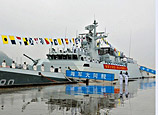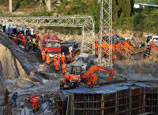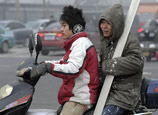
BEIJING, May 21 (Xinhua) -- As Chinese President Xi Jinping and his U.S. counterpart Barack Obama is ready to meet for the first time after the leadership transition in both nations, analysts say the June 7-8 summit in the U.S. state of California will chart the course of future development of China-U.S. relations.
They also believe that the meeting will show that China is determined to follow a policy of all-dimensional diplomacy, peaceful development and all-win cooperation.
SHARED DEMANDS AND COMMON RESPONSIBILITIES
At the moment, both China and the United States are working to boost their economies, promote employment, improve people's livelihood and advance economic restructuring. The expansion of bilateral cooperation in all sectors will benefit the two peoples.
Thus, a healthy development of the China-U.S. relationship is needed by both sides.
Chas Freeman, former U.S. assistant secretary of defense, told Xinhua in a recent interview that China and the United States are economically interdependent and politically engaged, yet there is potential for further development.
In fact, since the two nations completed their respective leadership transitions, the bilateral ties have seen a good start as Xi and Obama talked over phone, and a number of senior U.S. officials visited China one after another, including Secretary of Finance Jacob Lew, Secretary of State John Kerry, and Martin Dempsey, chairman of the joint chiefs of staff.
Ruan Zongze, deputy head of the China Institute of International Studies, said the upcoming Xi-Obama meeting could help shape the development of the China-U.S. relationship.
"The China-U.S. relations are now facing many opportunities as well as problems. Yet we cannot be burdened by these problems. Instead, we should look at the relationship from a long-term perspective," he said.
Ruan also said that the meeting could be a chance for the two leaders to shape the future bilateral ties in ways that are different from previous patterns.
Around the world, the Asia-Pacific region is where China and the United States share the most overlapping interests. Therefore, it is their common task to figure out how to maintain peace and promote cooperation in the region.
Right now, the Asia-Pacific region sees the fastest economic growth worldwide, and has been a major force to boost global economic recovery.
However, the region also faces a series of uncertainties, like the rocky situation in the Korean Peninsula, regional territorial disputes, and the U.S. policy of pivoting to Asia.
During his visit to the United States as China's vice president in February last year, Xi said the vast Pacific region has enough space for the development of both China and the United States, which should engage each other in a positive way in the region.
And it is expected that during their upcoming meeting, Xi and Obama would communicate and coordinate with each other over political, economic and security matters in the Asia-Pacific region.

















 China’s weekly story
China’s weekly story
(2013.5.11-5.17)


![]()
